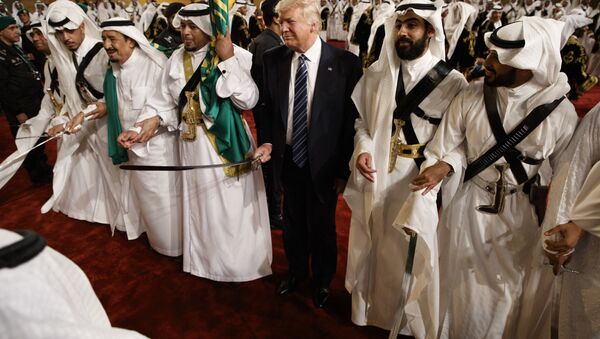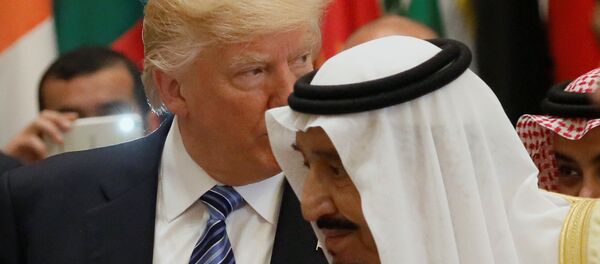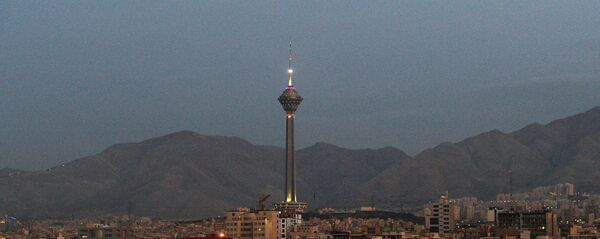It appears that US President Donald Trump has changed his mind about Saudi Arabia, which he criticized heavily while being a presidential candidate, Israeli political commentator Avigdor Eskin writes, reminding his readers of the role which generous Saudi donors still play in funding Sunni extremism in the Middle East.
"Donald Trump's first foreign trip following his election as [US] president has resulted in a huge arms deal with Saudi Arabia. The $110 billion contract will strengthen Trump's position among the supporters of the military-industrial complex," Eskin noted in his recent op-ed for RIA Novosti.
"We saw how Trump and Tillerson were 'enchanted' with a colorful Arabian dance with swords," Eskin noted. "The former head of the CIA, John Brennan — a passionate admirer and effective lobbyist for Saudi interests in Washington — might have had the 'Lawrence of Arabia' syndrome. Now Donald Trump has embarked on his predecessors' path."
The Israeli commentator recalled that very recently Trump fiercely and uncompromisingly criticized Riyadh.
If Saudi Arabia, which has been making one billion dollars a day from oil, wants our help and protection, they must pay dearly! NO FREEBIES.
— Donald J. Trump (@realDonaldTrump) 26 марта 2015 г.
"If Saudi Arabia, which has been making 1 billion dollars a day from oil, wants our help and protection, they must pay dearly! NO FREEBIES," Trump tweeted on March 26, 2015.
Furthermore, he openly lambasted Islamic extremism, saying "anyone who cannot condemn the hatred, oppression, and violence of Radical Islam lacks the moral clarity to serve as our president."
It is no secret, however, that generous Saudi donors have long been supporting Sunni extremists in the Middle East, Eskin remarked.
Indeed, one of the emails purportedly written by Hillary Clinton to John Podesta on August 17, 2014, and published by WikiLeaks, said: "We need to use our diplomatic and more traditional intelligence assets to bring pressure on the governments of Qatar and Saudi Arabia, which are providing clandestine financial and logistic support to ISIL [Daesh] and other radical Sunni groups in the region."
Citing Israeli Defense Minister Avigdor Lieberman and Israeli political analyst Dr. Yaron Friedman, Eskin called attention to Israel's concerns over the US-Saudi weapons deal and the latest Islamic summit.
"The deal concluded by President Trump and Saudi Arabia will have an immediate impact on the balance of power in the region. The endorsement of Riyadh [on the part of the US President] will be seen as a new encouraging signal for radicals around the world," Eskin suggested.
He reiterated that apparently it's time for Iran and Israel to meet each other at the negotiating table.
"The Saudi-American deal has become a lesson for us," the Israeli commentator emphasized. "Geopolitical flows and economic benefits are now stronger than the will of a man, even if he is the president of the United States. Donald Trump sincerely wanted to restore good relations with Russia and transfer the US Embassy to Jerusalem. He also sincerely intended to punish those countries that are engaged in spreading radical Islamism. However, the reverse has taken place."
"The arms deal signals that another US administration is willing to ignore the Saudis' major role in Sunni terrorism… in return for allowing the US to buy Saudi oil in US dollars," Grosscup told Sputnik.
For his part, John Walsh drew attention to Trump's demonization of Iran during his Riyadh visit.
"Iran is the stumbling block to President Trump's genuine desire to get along with Russia, obviously genuine since he is willing to pay such a high political price to do so. And a new detente with Russia is the most important thing Trump has promised," Walsh stressed.
The question whether Trump will deliver on his election promises concerning the US' foreign strategy still remains open; meanwhile, international observers are growing more skeptical about it.



